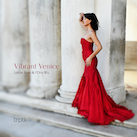

Lotte Bovi & l'Ora Blù: Vibrant Venice
TRPTK
In undertaking this project devoted to the baroque vocal music of eighteenth-century Venice, another singer might have styled her delivery after some objective ideal associated with the period; on this collaboration with the baroque ensemble l'Ora Blù, mezzo-soprano Lotte Bovi sings with a naturalism that feels worlds removed from that neutralizing approach. Here's a case where the vocalist's personality imposes itself fervently on the music and in doing so makes these pieces by Antonio Vivaldi (1678-1741), Niccolò Jommelli (1714-44), and Nicola Porpora (1686-1768) come all the more alive. The Venice about which she sings might be gone, but the city in all its vitality and allure rises again in these dynamic performances.
Bovi, who studied singing at the Royal Conservatory in The Hague and whose repertoire extends from Monteverdi to Bizet, recorded this splendid collection with L'Ora Blù in May 2023 at the Oude Kerk Charlois in Rotterdam. Her voice is splendidly complemented by the ensemble, which here comprises twelve instrumentalists—six violins, violoncello da spalla, cello, double bass, organ, natural horn (hunting horn), and lute, theorbo, and baroque guitar.
What, one might ask, do Vivaldi, Jommelli, and Porpora have in common? They all worked at two of Venice's then four orphanages, where children received, among other things, a musical education (Vivaldi, for example, taught violin and wrote pieces for the youngsters while at the Ospedale della Pieta, an orphanage for girls). It's worth noting that many of the arias on Vibrant Venice were written to be sung from a male perspective, mostly to a beloved, with only one on the album sung by a female character (Vivaldi's “Solo quella guancia bella”).
In addition to performing, Bovi contributed in-depth liner notes that provide informative historical context as well as synopses of the works from which the arias originate. She astutely notes of Vivaldi, “His vocal music is so well written for the singing voice, indicating his profound understanding of the possibilities of the vocal instrument and his desire to serve it with his music.” As enticing to her were works by Jommelli and Porpora, hence the triad of composers featured on the recording. Enhancing the appeal of their material is its engaging rhythmic dimension, not to mention the panorama of emotional expression encompassed by the set-list. Desire, rapture, and playfulness emerge but also anger and sorrow.
Porpora, who was both a singing instructor and composer, is represented on the release by the six-part cantata Salve Regina in F major, written for the girls of the Ospedale degli Incurabili in 1730. Following a lovely intro by l'Ora Blù, Bovi enriches the harmonious joy of “Salve Regina” with florid and graceful vocalizing. A yearning tone informs the stately “Ad te suspiramus,” after which the fleeting “Eia ergo, advocata nostra” enlivens the work with Mozartian energy and acrobatic vocal gestures. During the sombre “Illos tuos misericordes oculos” and rhapsodic “O clemens, o pia,” she embellishes the vocal lines circumspectly with nuance and elegance.
Under Vivaldi's direction, the concerts given by the girls from the Ospedale della Pietà attracted audiences from all over Europe. Pieces from four works by him appear, beginning with two from his thirteenth opera La verità in cimento, which premiered during the carnival in Venice in 1720. After the vocals-free “Sinfonia” allows the artistry of l'Ora Blù to shine, “Solo quella guancia bella” finds Bovi joyfully conveying the love Rosanna has for her future fiancé. Up next is the lustrous, swoon-inducing “Mentre dormi, amor fomenti” from the opera l'Olimpiade and scored for voice, string orchestra, and natural horn. Delivered at a furious tempo, “Armatae face et anguibus” comes from the theatrical oratorio Juditha Triumphans and makes heavy demands on Bovi's vocal agility. The last Vivaldi piece featured is the heartfelt serenade “Vedrò con mio diletto” from the 1724 opera Il Giustino, which replaces the ferocity of “Armatae face et anguibus” with intense expressions of ardent longing.
Like Vivaldi, Jommelli wrote material for the girls of, in his case, the Ospedale degli Incurabili. The stirring aria “Prigionier che fa ritorno” from his 1743 oratorio La Betulia liberata ends the album with nearly nine glorious minutes of vocal splendour and beguiling instrumental playing. On the aptly titled Vibrant Venice, the pairing of baroque ensemble and singer produces sterling results—a partnership Bovi and l'Ora Blù should definitely continue.April 2024